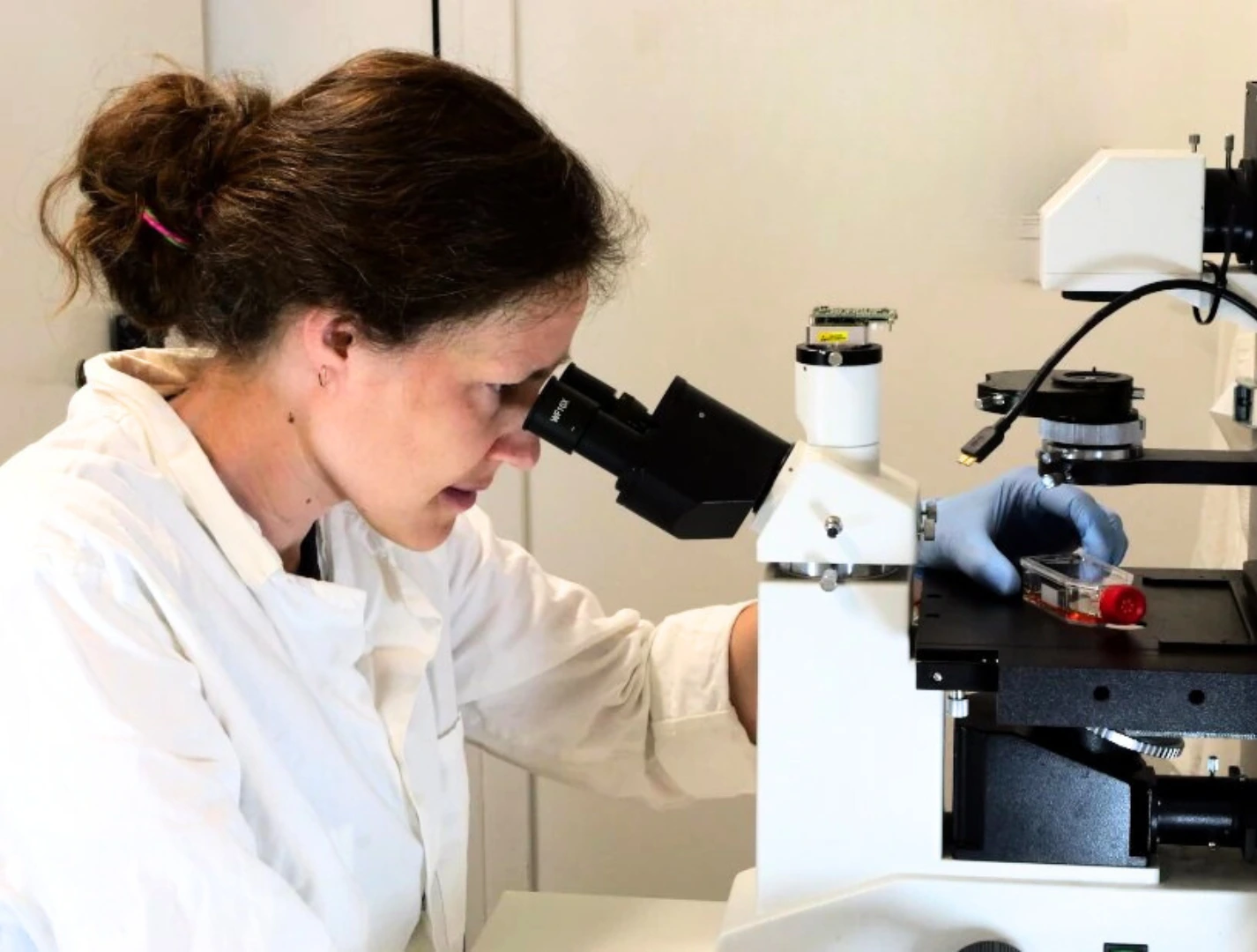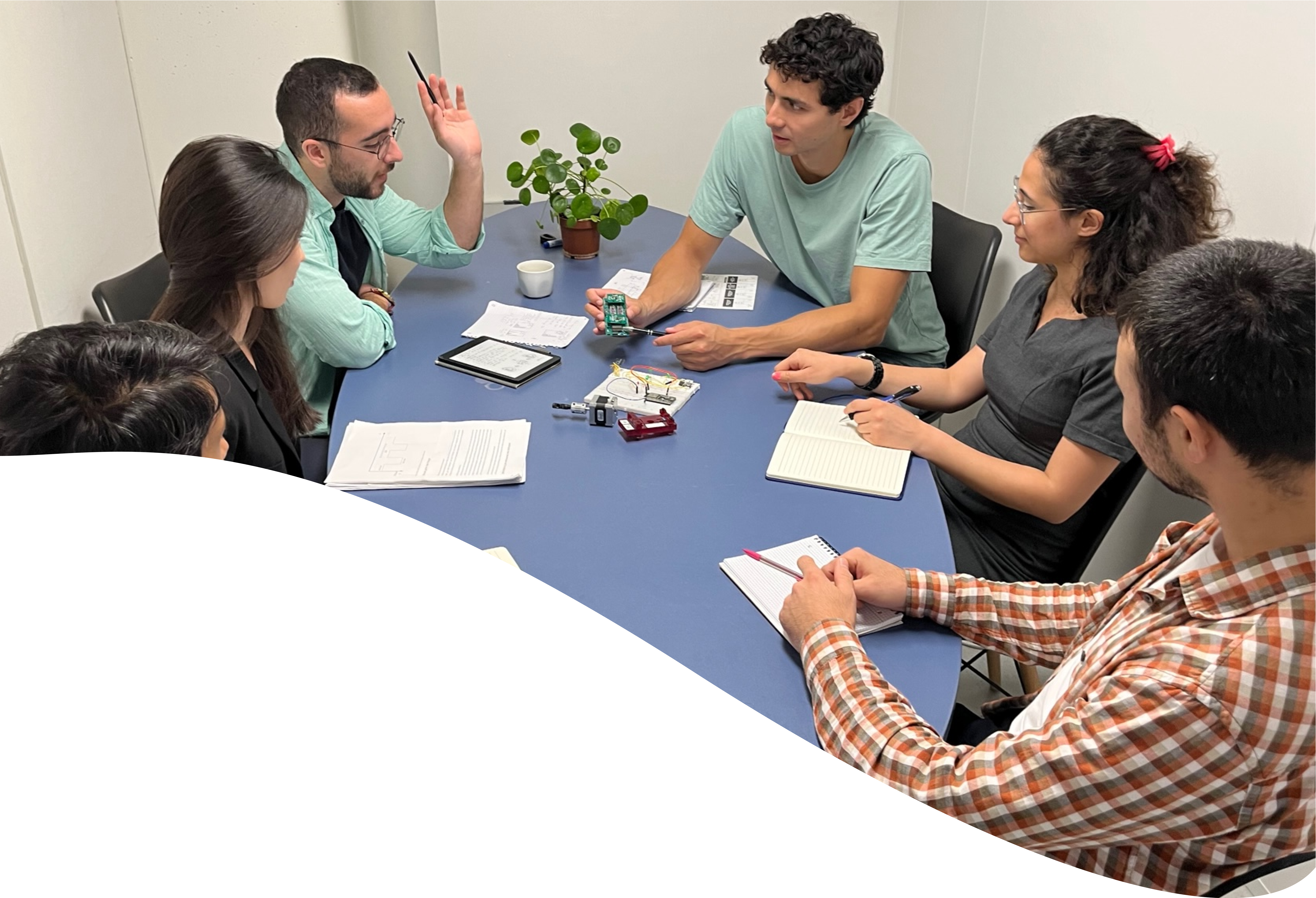Horizon Europe Cluster 1 - Health
Work Programme 2026-2027
Writer
Celeste Chidiac, PhD
Keywords
Microfluidic Devices, Intelligent Microfluidics, Artificial Intelligence, Machine Learning
Opening
February/June, 2026/2027
Deadline
April/September, 2026/2027
Keywords
Intelligent Microfluidics
Deep Learning
Microfluidic Devices
Artificial Intelligence
Machine Learning
Mental health
Data-driven tools
Environmental health
Healthcare systems
Digital solutions
Healthy society
Your microfluidic SME partner for Horizon Europe!
Calls ordered by microfluidic relevance
Horizon Europe Cluster 1 2026-2027
We have sorted the calls for projects from Horizon Europe Cluster 1 2026-2027 according to the impact that microfluidics can have on the calls for projects and related topics. We are sharing our analysis in case it can help you with project funding efforts. And, of course, if our expertise can be of use to you, we would be delighted to discuss it further.

How to read the stars in terms of % of microfluidic technologies’ relevance for the call:
By microfluidic relevance, we mean the relevance of using microfluidic technologies for the topic cited. But also, to a lesser extent, what a microfluidic laboratory or SME could contribute to the topic (mainly for calls with low relevance to microfluidic technologies).
Relevance (%) | 90-100 | 80-89 | 70-79 | 60-69 | 50-59 | 40-49 | 30-39 | 20-29 | 10-19 | 0-9 |
Relevance (*) | ***** | **** | *** | ** | * | – | – – | – – – | – – – – | – – – – – |
Quick microfluidic priority shortlist (ranked by relevance)
- HORIZON-HLTH-2027-02-IND-02 – PORTABLE AND VERSATILE POINT-OF-CARE DIAGNOSTICS (95%). Prime fit for lab‑on‑chip, sample‑to‑answer, microfluidic consumables, and manufacturing.
- HORIZON-HLTH-2026-01-TOOL-03 – INTEGRATING NEW APPROACH METHODOLOGIES (NAMS) TO ADVANCE BIOMEDICAL RESEARCH AND REGULATORY TESTING (92%). Organ-on-chip/microphysiological systems sit at the core.
- HORIZON-HLTH-2027-03-TOOL-02 – ADVANCING BIO‑PRINTING OF LIVING CELLS FOR REGENERATIVE MEDICINE (88%). Strong on bioprinting nozzles, controlled micro‑flows, cell handling.
- HORIZON-HLTH-2027-01-IND-01 – DEVELOPMENT OF CELL‑FREE PROTEIN SYNTHESIS PLATFORMS FOR DISCOVERY AND/OR PRODUCTION OF BIOLOGICALS (85%). Continuous‑flow CFPS reactors, droplet screening.
- HORIZON-HLTH-2026-01-IND-03 – REGULATORY SCIENCE TO SUPPORT TRANSLATIONAL DEVELOPMENT OF PATIENT‑CENTRED HEALTH TECHNOLOGIES (82%). Microfluidic evidence generation, real-world data, NAMs.
- HORIZON-HLTH-2027-02-TOOL-01-two-stage – DEVELOPMENT OF PREDICTIVE BIOMARKERS … USING AI (74%). Can power multi‑analyte on‑chip biomarker discovery.
- HORIZON-HLTH-2027-01-DISEASE-08 – DEVELOPMENT OF INNOVATIVE ANTIMICROBIALS AGAINST CRITICAL PATHOGENS (74%). On‑chip screening/chemostats, gradient generators.
- HORIZON-HLTH-2026-01-DISEASE-04 – DEVELOPMENT OF NOVEL VACCINES FOR VIRAL PATHOGENS WITH EPIDEMIC POTENTIAL (73%). Microfluidic formulation, nanoparticle QA/QC.
- HORIZON-HLTH-2027-01-DISEASE-05/06/07 – ANTIVIRALS & MONOCLONALS (72%). Droplet microfluidics for library screens; process analytics.
- HORIZON-HLTH-2027-01-TOOL-05 – PILOT ACTIONS FOR FOLLOW-ON FUNDING IN REGENERATIVE MEDICINE (70%). Scale‑up of organoids/bioprocesses with microfluidic control.
Administrative dates per call
- Single‑stage 2026 (HORIZON‑HLTH‑2026‑01) – Opening 10 Feb 2026, Deadline 16 Apr 2026.
- Partnerships 2026/1 (ERDERA) – Opening 10 Feb 2026, Deadline 15 Sep 2026.
- Partnerships 2026/3 (Pandemic Preparedness Phase 2) – Opening 10 Feb 2027, Deadline 13 Apr 2027.
- Partnerships 2026/4 (EP PerMed top‑up) – Opening 10 Feb 2026, Deadline 16 Apr 2026.
- Single‑stage 2027/1 (HORIZON‑HLTH‑2027‑01) – Opening 10 Feb 2027, Deadline 13 Apr 2027.
- Two‑stage 2027 (HORIZON‑HLTH‑2027‑02) – Opening 10 Feb 2027, Deadlines 13 Apr 2027 (1st), 22 Sep 2027 (2nd).
- Single‑stage 2027/2 (HORIZON‑HLTH‑2027‑03) – Opening 03 Jun 2027, Deadline 22 Sep 2027.
The CL1 work programme draft can be found in the following link: Cluster 1 – Health
(Full details for all topics are provided below, grouped by call and ordered by decreasing microfluidic relevance within each call.)
Discover more!
Horizon Europe Cluster 1 2026-2027 Calls ordered by microfluidic relevance
Download the Cluster 1 2026-2027 Call Calendar
CALL – CLUSTER 1 – HEALTH (SINGLE‑STAGE – 2026) · HORIZON‑HLTH‑2026‑01
Opening: 10 Feb 2026 · Deadline: 16 Apr 2026.
- Type of action: RIA
- Budget (topic, M€): 50.00 · Expected: 5.00-8.00 · #projects: 7 · Budget moyen: 7 142 857 €.
Scientific summary:
- Advance/validate NAMs (e.g., organ‑on‑chip, in‑silico) to replace/augment animal testing across biomedical research and regulatory contexts.
- Build interactive approaches to develop, test, and accelerate acceptance of NAMs.
Why microfluidics:
- MPS/organ‑on‑chip are core NAMs; microfluidics can deliver standardized platforms, inter-lab reproducibility, and qualification packages for regulators.
**** HORIZON‑HLTH‑2026‑01‑IND‑03 – REGULATORY SCIENCE TO SUPPORT TRANSLATIONAL DEVELOPMENT OF PATIENT‑CENTRED HEALTH TECHNOLOGIES
- Type: RIA · Budget: 20.00 M€ · Expected: 4.00-6.00 M€ · #projects: 4 · Budget moyen: 5 000 000 €.
Scientific summary:
- Improve regulatory methodologies and evidence frameworks (including RWD, NAMs, AI models) along the lifecycle of non‑pharma health technologies (MD, IVD, AI, SoHO).
Why microfluidics:
- Microfluidic devices (diagnostics/organ‑chips) are ideal case studies to produce regulatory‑grade evidence and pilot regulatory sandbox approaches.
*** HORIZON‑HLTH‑2026‑01‑DISEASE‑04 – DEVELOPMENT OF NOVEL VACCINES FOR VIRAL PATHOGENS WITH EPIDEMIC POTENTIAL
- Type: RIA · Budget: 45.00 M€ · Expected: ~10.00 M€ · #projects: 5 · Budget moyen: 9 000 000 €.
Scientific summary:
- Novel vaccine candidates vs epidemic‑potential viruses; strong preclinical packages and manufacturability.
Why microfluidics:
- Microfluidic nanoprecipitation/emulsification for vaccine formulation, on‑chip QA and process analytics.
*** HORIZON‑HLTH‑2026‑01‑DISEASE‑11 – UNDERSTANDING SEX/GENDER‑SPECIFIC MECHANISMS OF CARDIOVASCULAR DISEASES: DETERMINANTS, RISK FACTORS & PATHWAYS
- Type: RIA · Budget: 40.00 M€ · Expected: 6.00-7.00 M€ · #projects: 6 · Budget moyen: 6 666 667 €.
Scientific summary:
- Mechanistic research on sex/gender differences in CVD: determinants, risk factors, biological pathways.
Why microfluidics:
- Cardiac/vascular‑on‑chip to dissect sex‑specific responses under controlled hemodynamics and omics sampling.
** HORIZON‑HLTH‑2026‑01‑DISEASE‑03 – ADVANCING RESEARCH ON PREVENTION, DIAGNOSIS & MANAGEMENT OF POST‑INFECTION LONG‑TERM CONDITIONS
- Type: RIA · Budget: 40.00 M€ · Expected: 6.00-8.00 M€ · #projects: 5 · Budget moyen: 8 000 000 €.
Scientific summary :
- Mechanistic, diagnostic, and management strategies for post‑infection long‑term conditions.
Why microfluidics:
- Multiplex POC panels for inflammatory/metabolic markers; on‑chip models for persistence and host response.
– HORIZON‑HLTH‑2026‑01‑DISEASE‑15 – SCALING UP INNOVATION IN CARDIOVASCULAR HEALTH (CSA)
- Type: CSA · Budget: 2.00 M€ · Expected: ~2.00 M€ · #projects: 1 · Budget moyen: 2 000 000 €.
Scientific summary:
- Map gaps/solutions, develop SRIA, events, and capacity for personalized CVD prediction, screening, and prevention (links to VHT, genomics, EHDS).
Why microfluidics:
- Potential role as technology stakeholder (diagnostic biomarkers, organ‑chips); not a device RIA.
– HORIZON‑HLTH‑2026‑01‑ENVHLTH‑01 – TOWARDS A BETTER UNDERSTANDING & ANTICIPATION OF THE IMPACTS OF CLIMATE CHANGE ON HEALTH
- Type: RIA · Budget: 55.00 M€ · Expected: 7.00-8.00 M€ · #projects: 7 · Budget moyen: 7 857 143 €.
Scientific summary :
- Three broad foci (heat/environmental stress; extreme events; infectious diseases). Includes diagnostic capacity, rapid/portable standardized testing that can withstand climate extremes.
Why microfluidics:
- Opportunity in robust fieldable diagnostics and sample prep modules for climate‑sensitive pathogens.
– HORIZON‑HLTH‑2026‑01‑ENVHLTH‑04 – TOWARDS CLIMATE‑RESILIENT, PREPARED & CARBON‑NEUTRAL POPULATIONS AND HEALTHCARE SYSTEMS
- Type: RIA · Budget: 50.00 M€ · Expected: 7.00-8.00 M€ · #projects: 7 · Budget moyen: 7 142 857 €.
Scientific summary:
- System‑level resilience and preparedness of populations/health systems under climate stress.
Why microfluidics:
- Possible role via low‑power diagnostics and decentralized testing kits in resilience toolkits.
– HORIZON‑HLTH‑2026‑01‑CARE‑03 – IDENTIFYING & ADDRESSING LOW‑VALUE CARE IN HEALTH & CARE SYSTEMS
- Type: RIA · Budget: 45.00 M€ · Expected: ~10.00 M€ · #projects: 5 · Budget moyen: 9 000 000 €.
Scientific summary:
- Metrics, indicators, and interventions to reduce low‑value care; implementation and policy levers.
Why microfluidics:
- Indirect: opportunities where POC diagnostics reduce unnecessary imaging/labs or support de‑prescribing.
––– HORIZON‑HLTH‑2026‑01‑DISEASE‑09 – MULTISECTORAL APPROACH TO TACKLE CHRONIC NCDs BEYOND HEALTHCARE (GACD)
- Type: RIA · Budget: 12.00 M€ · Expected: 3.00-4.00 M€ · #projects: 3 · Budget moyen: 4 000 000 €.
Scientific summary:
- Implementation research spanning sectors/settings outside the clinic.
Why microfluidics:
- Possible community‑level testing pilots; still peripheral.
––– HORIZON‑HLTH‑2026‑01‑STAYHLTH‑02 – BEHAVIOURAL INTERVENTIONS AS PRIMARY PREVENTION FOR NCDs AMONG YOUNG PEOPLE
- Type: RIA · Budget: 21.00 M€ · Expected: 9.00-10.00 M€ · #projects: 2 · Budget moyen: 10 500 000 €.
Scientific summary:
- Implement evidence‑based behavioral interventions (ages 12–25); self‑monitoring with wearables/POC devices, RWD/AI, policy‑linked deployment.
Why microfluidics:
- Peripheral role (consumer‑grade sensors dominate).
–––– HORIZON‑HLTH‑2026‑01‑ENVHLTH‑05 – SUPPORT FOR A MULTILATERAL INITIATIVE ON CLIMATE CHANGE & HEALTH RESEARCH (CSA)
- Type: CSA · Budget: 3.00 M€ · Expected: ~3.00 M€ · #projects: 1 · Budget moyen: 3 000 000 €.
Scientific summary:
- Coordination/support for multilateral climate‑health research agenda.
Why microfluidics:
- Non‑technical CSA; MIC’s role limited to stakeholder input.
–––– HORIZON‑HLTH‑2026‑01‑CARE‑01 – PUBLIC PROCUREMENT OF INNOVATIVE SOLUTIONS FOR INTEGRATED & PERSONALISED ACCESS TO HEALTHCARE (PPI)
- Type: PPI · Budget: 25.00 M€ · Expected: 3.00-8.00 M€ · #projects: 4 · Budget moyen: 6 250 000 €.
Scientific summary:
- Demand‑side innovation procurement for integrated/personalized access solutions.
Why microfluidics:
- Microfluidics only if procurers define diagnostic needs; otherwise, peripheral.
––––– HORIZON‑HLTH‑2026‑01‑DISEASE‑02 – INNOVATIVE INTERVENTIONS TO PREVENT HARMFUL EFFECTS OF DIGITAL TECHNOLOGIES ON MENTAL HEALTH OF CHILDREN/YOUNG ADULTS
- Type: RIA · Budget: 45.00 M€ · Expected: ~8.00 M€ · #projects: 6 · Budget moyen: 7 500 000 €.
Scientific summary:
- Prevention strategies addressing mental‑health harms of digital tech among youth.
Why microfluidics:
- Outside microfluidic scope.
CALL – CLUSTER 1 – HEALTH (TWO‑STAGE – 2027) · HORIZON‑HLTH‑2027‑02
Opening: 10 Feb 2027 · Deadlines: 13 Apr 2027 (1st stage), 22 Sep 2027 (2nd stage).
***** HORIZON‑HLTH‑2027‑02‑IND‑02 – PORTABLE AND VERSATILE POINT‑OF‑CARE DIAGNOSTICS
- Type of action: IA
- Call: Cluster 1 – Health (Two-stage – 2027)
- Budget (topic, M€): 40.00
- Expected EU contribution per project (M€): 5.00-7.00
- Estimated number of projects granted: 6
- Average budget per project (€): 6 666 667 € (40.00 M€ × 1 000 000 / 6).
Scientific summary:
- Push PoC diagnostics that are more sensitive, specific, robust, and easy‑to‑use, addressing false results and cumbersome sample prep.
- Align with WHO REASSURED criteria; emphasize sample‑to‑answer, miniaturization, versatility of specimen types, manufacturability, high‑throughput readiness, quality control, and regulatory compliance.
- Integrate mobile technologies and ML/AI for data acquisition/analysis; ensure suitability for resource-limited settings.
- Applicable to infectious and non-communicable disease testing and longitudinal monitoring.
Why microfluidics:
- Lab-on-chip sample preparation and detection (nucleic acid, protein, cell) to achieve REASSURED and sample-to-answer.
- Droplet and paper microfluidics for multiplexing and low-cost disposables; on-chip isothermal amplification; integrated solid‑phase extraction.
- Design-for-manufacture of microfluidic cartridges, with scalability to injection-moulded and roll-to-roll parts.
- Embedded sensors and on‑chip QC to reduce false negatives/positives; connectivity for readouts.
- MICROFLUIDIC can supply prototype-to-pilot platforms meeting regulatory and quality needs in the IA frame.
*** HORIZON‑HLTH‑2027‑02‑TOOL‑01‑two‑stage – DEVELOPMENT OF PREDICTIVE BIOMARKERS OF DISEASE PROGRESSION AND TREATMENT RESPONSE BY USING AI (CHRONIC NCDs)
- Type of action: RIA
- Call: Cluster 1 – Health (Two‑stage – 2027)
- Budget (topic, M€): 45.00
- Expected EU contribution per project (M€): 6.00-8.00
- Estimated number of projects granted: 6
- Average budget per project (€): 7 500 000 €.
Scientific summary:
- AI-driven discovery/validation of predictive biomarkers of progression/response in chronic NCDs.
- Leverage multimodal data (omics, imaging, clinical, sensor‑derived), RWD, privacy/security‑by‑design.
- Emphasis on robust, generalizable models and clinical utility supporting precision prevention/treatment.
Why microfluidics:
- Multiplexed microfluidic assays (exosomes, cytokines, cfDNA) generate high‑quality biosignatures for AI pipelines.
- Single‑cell and organ‑on‑chip enable functional biomarkers under controlled microenvironments.
- MICROFLUIDIC can provide standardized sample‑to‑AI workflows and validated cartridge‑based tests.
– HORIZON‑HLTH‑2027‑02‑DISEASE‑01‑two‑stage – INNOVATIVE HEALTHCARE INTERVENTIONS FOR NON‑COMMUNICABLE DISEASES
- Type of action: RIA
- Budget (topic, M€): 65.00
- Expected EU contribution per project (M€): 7.00-8.00
- Estimated number of projects granted: 8
- Average budget per project (€): 8 125 000 €.
Scientific summary:
- Design, test, and validate innovative interventions for high‑burden NCDs; strong clinical and implementation focus.
- Incorporate precision, prevention, risk stratification, and patient-centred outcomes.
Why microfluidics:
- Niche contribution via point-of-need tests to enable stratification/monitoring within intervention studies.
- Less direct if interventions are behavioral or systemic rather than diagnostic/bioprocess.
––– HORIZON‑HLTH‑2027‑02‑DISEASE‑14‑two‑stage – CLINICAL TRIALS FOR ADVANCING INNOVATIVE INTERVENTIONS FOR NEURODEGENERATIVE DISEASES
- Type of action: RIA
- Budget (topic, M€): 40.00
- Expected EU contribution per project (M€): ~10.00
- Estimated number of projects granted: 4
- Average budget per project (€): 10 000 000 €.
Scientific summary:
- Patient-relevant clinical trials for neurodegenerative disorders; robust endpoints, trial readiness, stratification.
Why microfluidics:
- Limited direct role; possible CSF/blood biomarker cartridge development or in-clinic monitoring tools.
CALL – CLUSTER 1 – HEALTH (SINGLE‑STAGE – 2027/2) · HORIZON‑HLTH‑2027‑03
Opening: 03 Jun 2027 · Deadline: 22 Sep 2027
**** HORIZON‑HLTH‑2027‑03‑TOOL‑02 – ADVANCING BIO‑PRINTING OF LIVING CELLS FOR REGENERATIVE MEDICINE
- Type of action: RIA
- Budget (topic, M€): 45.00
- Expected EU contribution per project (M€): 7.00-10.00
- Estimated number of projects granted: 5
- Average budget per project (€): 9 000 000 €.
Scientific summary:
- Advance bio‑printing technologies and translation for regenerative medicine.
- Quality, viability, function, and integration of printed constructs; towards clinically relevant use‑cases.
Why microfluidics:
- Microfluidic printheads for coaxial/multimaterial deposition; shear-controlled cell handling.
- Perfusable micro‑vasculature and bioreactors for maturation; process analytics inline.
– HORIZON‑HLTH‑2027‑03‑TOOL‑04 – VIRTUAL HUMAN TWINS (VHTs) FOR INTEGRATED CLINICAL DECISION SUPPORT IN PREVENTION AND DIAGNOSIS
- Type of action: RIA
- Budget (topic, M€): 45.00
- Expected EU contribution per project (M€): 10.00–12.00
- Estimated number of projects granted: 4
- Average budget per project (€): 11 250 000 €.
Scientific summary :
- Multiscale, multi‑organ VHT solutions; focus on prevention/diagnosis in high‑burden diseases; integration into care pathways and with other decision tools.
Why microfluidics:
- Indirect: organ-on-chip data can parameterize/validate VHT models; limited core role for microfluidic hardware.
–––– HORIZON‑HLTH‑2027‑03‑TOOL‑08 – TOWARDS ARTIFICIAL GENERAL INTELLIGENCE (AGI) FOR HEALTHCARE (CSA)
- Type of action: CSA
- Budget (topic, M€): 3.00
- Expected EU contribution per project (M€): ~3.00
- Estimated number of projects granted: 1
- Average budget per project (€): 3 000 000 €.
Scientific summary:
- Road‑mapping/coordination toward safe, trustworthy AGI for health; standards, ethics, governance.
Why microfluidics:
- Very indirect; possible contribution via datasets from microfluidic diagnostics, non-core.
CALL – CLUSTER 1 – HEALTH (SINGLE‑STAGE – 2027/1) · HORIZON‑HLTH‑2027‑01
Opening: 10 Feb 2027 · Deadline: 13 Apr 2027
**** HORIZON‑HLTH‑2027‑01‑IND‑01 – DEVELOPMENT OF CELL‑FREE PROTEIN SYNTHESIS PLATFORMS FOR DISCOVERY AND/OR PRODUCTION OF BIOLOGICALS
- Type of action: RIA
- Budget (topic, M€): 35.00
- Expected EU contribution per project (M€): 6.00–8.00
- Estimated number of projects granted: 5
- Average budget per project (€): 7 000 000 €.
Scientific summary:
- Mature CFPS platforms for faster design-build-test-learn cycles and scalable production of protein biologics; lower cost and improved scalability/quality.
Why microfluidics:
- Continuous‑flow and droplet CFPS reactors for rapid prototyping and mini‑biomanufacturing.
- Inline process monitoring and automated screening of variants; integration with downstream analytics.
*** HORIZON‑HLTH‑2027‑01‑DISEASE‑08 – DEVELOPMENT OF INNOVATIVE ANTIMICROBIALS AGAINST CRITICAL PATHOGENS RESISTANT TO ANTIMICROBIALS
- Type of action: RIA · Budget: 45.00 M€ · Expected: 8.00-10.00 M€ · #projects: 5 · Budget moyen: 9 000 000 €.
Scientific summary:
- Discovery/optimization of antibacterials against critical, resistant pathogens; robust pre-clinical packages.
Why microfluidics:
- On-chip chemostats/gradients for MBC determination and resistance evolution studies; HT screens in droplets.
*** HORIZON‑HLTH‑2027‑01‑DISEASE‑05 – BROAD‑SPECTRUM SMALL‑MOLECULE ANTIVIRALS (EPIDEMIC POTENTIAL)
- Type of action: RIA · Budget: 45.00 M€ · Expected: ~10.00 M€ · #projects: 5 · Budget moyen: 9 000 000 €.
Scientific summary:
- First-in-class broad-spectrum antivirals; preclinical/PK-PD, resistance, and potency versus priority viruses.
Why microfluidics:
- Microreactor synthesis and droplet assays for fast SAR; on‑chip infection models enhance throughput.
*** HORIZON‑HLTH‑2027‑01‑DISEASE‑06 – MONOCLONAL ANTIBODIES TO PREVENT/TREAT INFECTIONS FROM FLAVIVIRIDAE
- Type of action: RIA · Budget: 45.00 M€ · Expected: ~10.00 M€ · #projects: 5 · Budget moyen: 9 000 000 €.
Scientific summary:
- Discovery and engineering, as well as preclinical development, of monoclonal antibodies (mAbs) against Flaviviridae.
Why microfluidics:
- Single‑cell antibody discovery, droplet screening, micro‑bioprocess analytics for manufacturability.
*** HORIZON‑HLTH‑2027‑01‑DISEASE‑07 – MONOCLONAL ANTIBODIES TO PREVENT/TREAT INFECTIONS FROM FILO‑, NAIRO‑, PHENUI‑, PICORNA‑ & TOGA VIRIDAE
- Type of action: RIA · Budget: 45.00 M€ · Expected: ~10.00 M€ · #projects: 5 · Budget moyen: 9 000 000 €.
Scientific summary:
- As above, for additional viral families; breadth/neutralization, escape management.
Why microfluidics:
- Same microfluidic value chain: HT single‑cell recovery, affinity/function screens on‑chip, Qc.
*** HORIZON‑HLTH‑2027‑01‑TOOL‑05 – PILOT ACTIONS FOR FOLLOW‑ON FUNDING: REGENERATIVE MEDICINE
- Type of action: IA · Budget: 40.00 M€ · Expected: 6.00-8.00 M€ · #projects: 5 · Budget moyen: 8 000 000 €.
Scientific summary:
- Translate/scale promising EU-funded regenerative medicine outputs; manufacturing readiness, clinical adoption, ecosystems.
Why microfluidics:
- Perfusion bioreactors, controlled microenvironments, and inline sensing to scale cell/tissue products; microfluidics can de-risk CMC.
** HORIZON‑HLTH‑2027‑01‑CARE‑02 – PERSONALISED APPROACHES TO REDUCE RISKS FROM ADVERSE DRUG REACTIONS DUE TO MULTIPLE MEDICATIONS
- Type of action: RIA · Budget: 45.00 M€ · Expected: 8.00-10.00 M€ · #projects: 5 · Budget moyen: 9 000 000 €.
Scientific summary:
- Personalised strategies to mitigate ADRs in polypharmacy; pharmacogenomics, tools, care models.
Why microfluidics:
- Point‑of‑care TDM chips and metabolite panels; organ‑on‑chip for DDI risk profiling.
* HORIZON‑HLTH‑2027‑01‑ENVHLTH‑MISSCLIMA‑03 – TOOLS & TECHNOLOGIES TO SUPPORT HEALTH ADAPTATION TO CLIMATE CHANGE (PCP)
- Type of action: PCP · Budget: 20.00 M€ · Expected: 4.00-5.00 M€ · #projects: 4 · Budget moyen: 5 000 000 €.
Scientific summary:
- Pre‑commercial procurement of tools for climate‑health adaptation (surveillance, decision support).
Why microfluidics:
- Potential for fieldable biosensors/sample prep modules in surveillance kits; role depends on procurers’ specs.
– HORIZON‑HLTH‑2027‑01‑ENVHLTH‑02 – INTEGRATING CLIMATE‑RELATED EXPOSURES INTO THE HUMAN EXPOSOME
- Type of action: RIA · Budget: 42.00 M€ · Expected: 10.00-11.00 M€ · #projects: 4 · Budget moyen: 10 500 000 €.
Scientific summary:
- Integrate climate exposures into the human exposome; advanced measurement pipelines and data integration.
Why microfluidics:
- Wearable/microfluidic samplers and multi‑analyte chips to capture exposures at high temporal resolution.
––– HORIZON‑HLTH‑2027‑01‑DISEASE‑10 – PREVENTION & MANAGEMENT OF NCDs IN CHILDREN & YOUNG PEOPLE (GACD)
- Type of action: RIA · Budget: 12.00 M€ · Expected: 3.00-4.00 M€ · #projects: 3 · Budget moyen: 4 000 000 €.
Scientific summary:
- Implementation research for NCDs in youth with GACD cooperation.
Why microfluidics:
- Marginal; possible home‑sampling devices for monitoring, but social/behavioral focus dominates.
–––– HORIZON‑HLTH‑2027‑01‑STAYHLTH‑01 – ADDRESSING DISABILITIES THROUGH THE LIFE COURSE TO SUPPORT INDEPENDENT LIVING & INCLUSION
- Type of action: RIA · Budget: 40.00 M€ · Expected: 6.00-8.00 M€ · #projects: 5 · Budget moyen: 8 000 000 €.
Scientific summary:
- Develop inclusive care models, person‑centred solutions for independent living; strong SSH and stakeholder co‑creation.
Why microfluidics:
- Out of microfluidic core; at most assistive biosensors in specific use‑cases.
CALL – PARTNERSHIPS IN HEALTH (2026/3) · HORIZON‑HLTH‑2026‑03
Opening: 10 Feb 2027 · Deadline: 13 Apr 2027.
– HORIZON‑HLTH‑2026‑03‑DISEASE‑13 – EUROPEAN PARTNERSHIP FOR PANDEMIC PREPAREDNESS (PHASE 2)
- Type: Co-funded European Partnership
- Budget (topic, M€): 40.00 (2026) + 33.00 (2027) = 73.00
- Estimated number of projects granted: 1
Scientific summary:
- Co‑funded partnership to coordinate pandemic preparedness R&I agendas and national co‑funding.
Why microfluidics:
- Potential inclusion in countermeasure testbeds (rapid diagnostics, on‑chip surveillance).
CALL – PARTNERSHIPS IN HEALTH (2026/1) · HORIZON‑HLTH‑2026‑02
Opening: 10 Feb 2026 · Deadline: 15 Sep 2026.
–– HORIZON‑HLTH‑2026‑02‑DISEASE‑12 – EUROPEAN PARTNERSHIP ON RARE DISEASES (ERDERA) (PHASE 2) (COFUND)
- Type: COFUND
- Budget (topic, M€): 30.00 (2026) + 63.00 (2027) = 93.00
- Estimated number of projects granted: ~93 (across the Partnership)
- Average budget per project (€): 1 000 000 €
Scientific summary:
- COFUND for rare‑disease transnational projects; portfolio‑type funding.
Why microfluidics:
- Targeted contributions in rare‑disease diagnostics (ultra‑low‑sample assays, single‑cell chips).
CALL – PARTNERSHIPS IN HEALTH (2026/4) · HORIZON‑HLTH‑2026‑04
Opening: 10 Feb 2026 · Deadline: 16 Apr 2026.
–– HORIZON‑HLTH‑2026‑04‑CARE‑04 – ENHANCING & ENLARGING THE EUROPEAN PARTNERSHIP ON PERSONALISED MEDICINE (EP PerMed) (TOP‑UP) (COFUND)
- Type: COFUND
- Budget (topic, M€): 15.00
- Expected EU contribution per project (M€): ~15.00
- Estimated number of projects granted: 1
Scientific summary:
- Top‑up to EP PerMed to enhance/enlarge personalized medicine activities.
Why microfluidics:
- Microfluidic precision diagnostics and organoid‑on‑chip can feed PM pipelines; governance/portfolio focus is indirect.
DISEASE‑FOCUSED TOPICS (ADDITIONAL DETAILS)
(Already placed above within their calls; scope pointers here for completeness and traceability):
- DISEASE‑05/06/07/08 virology/AMR topic scopes and expected outcomes are detailed in the topic list with specific families/targets; all use RIA frames with 45.00 M€ topic budgets and ~5 projects.
- DISEASE‑03 post‑infection long‑term conditions mix mechanistic and translational work.
- DISEASE‑11 emphasizes sex/gender‑specific mechanisms and risk pathways in CVD.
ENVIRONMENT & CLIMATE HEALTH TOPICS (ADDITIONAL DETAILS)
- ENVHLTH‑01 explicitly calls for rapid, portable diagnostics that can withstand climate extremes, alongside surveillance and modelling.
- ENVHLTH‑02 focuses on integrating climate exposures into the exposome with advanced measurement/data pipelines.
Find all these information in the pdf below
The MIC already brings its expertise in microfluidics to Horizon Europe:
H2020-NMBP-TR-IND-2020

Microfluidic platform to study the interaction of cancer cells with lymphatic tissue
H2020-LC-GD-2020-3

Toxicology assessment of pharmaceutical products on a placenta-on-chip model



